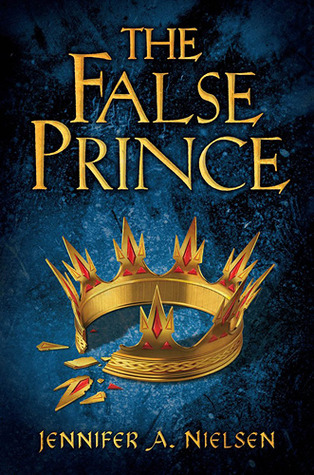New job, new challenges.
I've inherited sets of this year's Maud Hart Lovelace Book Award titles (the Division II titles, to be clear). They're all a few years old, but since most of my YA reading has skewed older, most of these books are new to me. But I like to be thorough and I like to be knowledgable in my recommendations, so I've taken it upon myself to burn through the eleven books I haven't already read (that one I have read being Rebecca Stead's Liar & Spy, which I liked, though not as much as When You Reach Me).
Enough of the exposition. Let's talk about some books (spoilers abound).
Right now, Jennifer A. Nielsen's The False Prince has my vote. It's exciting and well-written and has a fairly well-concealed twist that, in hindsight, is really well set up. This was the read-aloud book in a classroom I did some clinical stuff in, so I had heard a few of the later chapters and knew that Sage was Jaron, though knowing that didn't lessen my enjoyment of the story. In fact, I was impressed with the number of hints that Nielsen sprinkles throughout.
That said, a couple of complaints. 1) The story takes place over two weeks. It's just entirely unrealistic that illiterate and unskilled orphans could be given the education needed to pass themselves off as a prince in two weeks. Is this a little nit-picky? Perhaps. But something about it just screamed "middle grade reader" at me, and not in a good way. 2) There's a chapter near the end where the narrative perspective shifts from Sage/Jaron's standard first-person to what seems to be a third-person omniscient. It was weird and unnecessary and, again, maybe not something a middle schooler would complain about, but it took me out of the story.
Book #2 is Janet Tashjian's My Life as a Book, with illustrations from her teen-age son Jake. The story is pretty light, but I have to admit, more affecting than I would have expected. The room got a bit dusty when Derek's mom decided to allow Mrs. James to keep her illusory version of how her daughter died. I don't have strong feelings one way or the other about the illustrations - they're fine and they give kids something to look at, but they're hit or miss when it comes to actually defining the words they intend to define.
No real complaints about MLAAB. One of the blurbs describes it as a kinder, gentler Wimpy Kid, which seems about right, although the illustrations serve a slightly different purpose.
My final book in this entry is Cynthia DeFelice's Wild Life.
It's fine, I guess. I'm certainly not the target audience, although a lot of Erik's story is pretty familiar. I grew up on the prairie; while I'm not a farm kid, I'm only a generation removed and I spent a lot of time as a kid at my grandparents' farm. My dad hunts a little (deer), as do some of my uncles and cousins. Given the number of kids around here who can identify with at least some of what Erik does, I think this book might find an audience. That said, it's fairly predictable and almost entirely lacking in danger or suspense - kind of a problem in a survival story. Erik never seems to be in great danger and it's obvious upon meeting Big Darrell that Erik's presence, or lack thereof, will soften him up by the end of the book. About the only surprise is that Erik doesn't get to keep Quill, but even this blow is softened considerably by his complacent (I suppose some might call it stoic) acceptance.
Next time: Breathing Room, Belly Up, and Icefall. (And maybe one other - we'll see.)



No comments:
Post a Comment